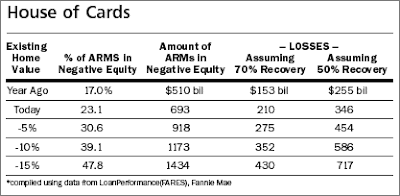The 100 Year Storm Part IV
04/19/06: Negative equity epidemic:
Nearly 1 in 10 households with a mortgage had zero or negative equity in their homes as of September 2005.
Also, 1 in 5 borrowers who took loans in 2004 were already underwater.
If home prices nationally were to fall by 10% nearly half of 2004's borrowers and 17.7% of borrowers overall would owe more on their homes than they're worth.
10/10/06 Ouch! Your Mortgage Payment Just Doubled:
Senate testimony from Allen Fishbein Director of Housing & Credit, Consumer Federation of America:
Nearly a third (29 percent) of borrowers who took out loans in 2005 had no equity in their homes or owed more than their homes are worth.

From The Big Picture ARM's Underwater:
After modest reflection, any disinterested observer can't help but find that accompanying table quite alARMing.
What its blood-curdling numbers depict is that the woes of mortgage lenders are not, as so widely believed, confined to the beleaguered subprime contingent, but are casting a much larger and chillier shadow.
More specifically, the table shows all too clearly that an astounding percentage of adjustable-rate mortgages already are underwater,
and it estimates how much equity would be wiped out if home values decline by 5%, 10% and 15% and translates the corresponding losses into dollars.
As Stephanie Pomboy comments: "Based on the share of ARMs in some state of negative equity at the end of last year and the decline in home prices so far in 2007, a stunning $693 billion in mortgage loans are already in the red."
The Economist follows up on Ms. Pomboy with Another Pounding?
Figures from MacroMavens (Stephanie Pomboy) an economic consultancy, suggest that 23% of adjustable-rate mortgages, covering loans with a value of $693 billion, are already in negative equity,
The current fear is not so much that the housing market could drive America into recession, although that could still happen. The worry is more that credit conditions may get tighter.
The spread paid by higher risk European firms has increased by almost a percentage point (100 bps) since mid-June.
Nearly 1 in 10 households with a mortgage had zero or negative equity in their homes as of September 2005.
Also, 1 in 5 borrowers who took loans in 2004 were already underwater.
If home prices nationally were to fall by 10% nearly half of 2004's borrowers and 17.7% of borrowers overall would owe more on their homes than they're worth.
10/10/06 Ouch! Your Mortgage Payment Just Doubled:
Senate testimony from Allen Fishbein Director of Housing & Credit, Consumer Federation of America:
Nearly a third (29 percent) of borrowers who took out loans in 2005 had no equity in their homes or owed more than their homes are worth.

From The Big Picture ARM's Underwater:
After modest reflection, any disinterested observer can't help but find that accompanying table quite alARMing.
What its blood-curdling numbers depict is that the woes of mortgage lenders are not, as so widely believed, confined to the beleaguered subprime contingent, but are casting a much larger and chillier shadow.
More specifically, the table shows all too clearly that an astounding percentage of adjustable-rate mortgages already are underwater,
and it estimates how much equity would be wiped out if home values decline by 5%, 10% and 15% and translates the corresponding losses into dollars.
As Stephanie Pomboy comments: "Based on the share of ARMs in some state of negative equity at the end of last year and the decline in home prices so far in 2007, a stunning $693 billion in mortgage loans are already in the red."
The Economist follows up on Ms. Pomboy with Another Pounding?
Figures from MacroMavens (Stephanie Pomboy) an economic consultancy, suggest that 23% of adjustable-rate mortgages, covering loans with a value of $693 billion, are already in negative equity,
The current fear is not so much that the housing market could drive America into recession, although that could still happen. The worry is more that credit conditions may get tighter.
The spread paid by higher risk European firms has increased by almost a percentage point (100 bps) since mid-June.
Comments